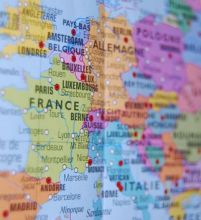This report, authored by Senior Fellow Robert A. Manning, was written for the Transatlantic Partnership for the Global Future, a project organized in cooperation with the Government of Sweden, to bring together experts from government, business, and academia to address critical questions relating emerging technologies to global challenges and explore their effects on transatlantic relations in the near- and long-term.
Over the next generation, Europe will be buffeted by waves of transformation. The reaction to the economic crisis, the rapid empowerment of individuals thanks to the growth of information technology, the reality of climate change, the diffusion of power across the globe, and demographic changes will shape the continent’s future. We are approaching an inflection point that could lead to a future of economic and political volatility and zero-sum behavior of inward-looking nationalisms; a more collaborative rules based world marked by cooperative efforts at global problem-solving; or perhaps most likely, some hybrid featuring elements of both. Tailored to address the distinct challenges Europe faces, this report draws upon the US National Intelligence Council’s Global Trends 2030: Alternative Worlds and provides further, in-depth analysis on the policy priorities and opportunities for Europe in the future.
